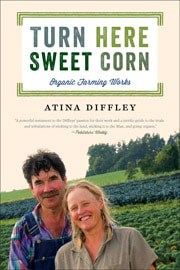Dear Valerie: Cigars and Tobacco Mosaic Virus
On Dec 4, 2012, at 6:02 PM, Valerie . . . wrote to Atina Diffley:
Hi Atina,
Firstly I LOVE your book!
My husband and a group of his friends get together about once a month and smoke cigars. Last summer one evening it was at our house and they smoked on the back deck which is level with and about 8′ away from my vegetable garden. I did not put it together with the smoking but my tomatoes were a total flop last year. Some people said it was blight. This year when the smoker was at our house it rained so they moved it to my front porch nowhere near my vegetable garden. I had a nice crop this year . . . actually still have kale growing. Before I become the wicked witch and ban the guys from smoking here do you think it was the tobacco mosaic you speak about on page 310 that messed up my crop last year. It seemed like no matter what I did they just seemed dehydrated. My husband suggested I contact you before I ban the smoker.
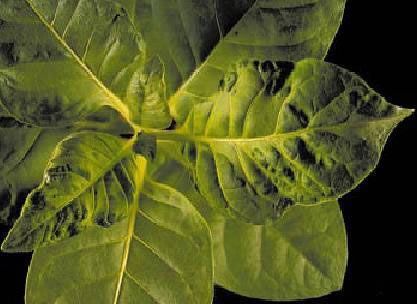
A tobacco plant infected with Tobacco Mosaic Virus. Knapp, E. and Lewandowski, D. J. 2001. Tobacco mosaic virus, not just a single component virus anymore. Molecular Plant Pathology 2(3):117–123. Article first published online : 21 DEC 2001, DOI: 10.1046/j.1364-3703.2001.00064.x
Thank you!!
Valerie
On Dec 11, 2012 at 1:02 pm Atina Diffley responded:
Dear Valerie,
According to plant pathologists at the University of Minnesota, Tobacco Mosaic Virus is one of the most common plant virus diseases in Minnesota. The dreaded virus is transmittable to tomatoes via tobacco smoke in the air, or transferred via smoke on human/animal skin or clothing. It can survive for up to 50 years in dried plant parts, and there are no efficient chemical or organic treatments that protect tomatoes from the infection or that eliminate viral infections from plant tissues once they do occur. Thus the only known controls are prevention, ie. limiting its spread. Detailed information from the University of Minnesota can be found here.
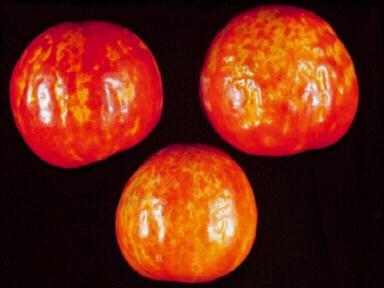
Typical mottling symptoms appearing on tomato fruit with Tobacco Mosaic Virus (photo John Paul Jones).
It is quite possible that your tomato plants suffered Tobacco Mosaic Virus, however, without the actual plants for physical identification and/or a lab tissue test I fear your claim could be rejected as specious. The plants could also have been infected with late or early blight, anthracnose, septoria leaf spot, fusarium or verticillium wilt, bacterial spot or speck or canker, or a host of other frightful tomato diseases. In fact, it is highly probable that a combination of pathogens caused your plant’s distress–they frequently operate in tandem.
Even if credible evidence were at hand, your advocacy for preventative health measures may be a challenging concept for people who smoke on a regular basis. Since you’ve read Turn Here Sweet Corn, you know I am a strong supporter of women not-giving-up-their-personal-power. I encourage you to carefully evaluate your goals, motives, and all involved parties’ personal agendas in this case while also considering the finances, food supply, and the health–both physical and emotional–of all your family members. (including pets and plants)
I am confident that once you are clear on your priorities you will be able to achieve an outcome based on what is best for you and your family. In the case of the Koch pipeline legal proceeding we were creating a first-of-its-kind organic mitigation plan, designed to “make an offense or crime less serious or more excusable, less harsh, severe, or violent,” and our livelihood and the food source of many eaters was threatened. A complete prohibition of smoking and smoke on pipeline worker’s clothes and bodies while working on our organic farm was our desired outcome.
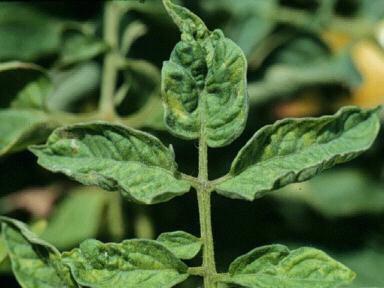
The leaves of a tomato plant with Tobacco Mosaic Virus exhibit a clear mosaic pattern. (photo John Paul Jones)
In your case, cigars are an ancient and oft-repeated source of spousal disagreement, and compromise is likely possible as the smokers could choose to move to a different part of your home, and refrain from wandering in the garden. Or you could choose to indulge your husband knowing that your tomato needs can be met by the many farmers at the farmers market anxious to cash in on his habit and social life.
We have had another cigar experience that may be of use in your present situation. A female neighbor of ours was an antique collector and fed up with her husband’s daily cigar smoke. She told him that he could either stop smoking in the house, or build an additional room to store her antiques sans cigars. He choose the latter, a three season room was added onto the house, and she moved her antiques there. Their problem appeared to be solved, but then, ironically, the main house caught fire and was completely destroyed except for the added-on room, which survived the fire with the antiques intact. We purchased the room and moved it to our farm where it now serves as a summer cabin (non-smoking). While this story is clearly hearsay when holding court with a Tabagie,* it may serve as a helpful antidote to share in private with your husband if he resists a compromise and you wish to draw in further influence of a slightly hoodoo nature to emphasis your point.
Best to you and may your smoke issues be peacefully mitigated for your household and garden,
Sincerely, Atina Diffley
*Tabagie: A group of smokers who meet as a club, (1819).
© 2012 by Atina Diffley, All Rights Reserved.
Subscribe to Atina Diffley’s Blog, What Is A Farm?
Read Turn Here Sweet Corn | Amazon | Barnes & Noble | IndieBound | University of MN Press
Atina Diffley is an organic consultant (Organic Farming Works LLC), educator, public speaker, and author of the 2012 memoir, Turn Here Sweet Corn: Organic Farming Works, published by the University of Minnesota Press. Until 2008, she and her husband Martin ran the Gardens of Eagan, one of the first certified organic produce farms in the Midwest. One of her favorite things in the world is rain.
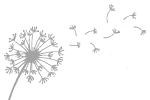
Read Atina Diffley's Blog: What Is A Farm?
Subscribe By Email. It’s Free
Enter your email address:
Worshops & Consulting
Visit Organic Farming Works LLC for Workshops and Coaching/Consulting with Atina and Martin Diffley.

